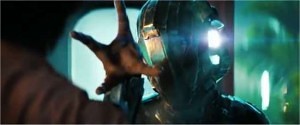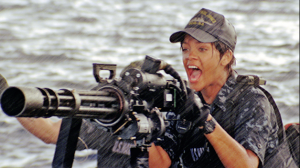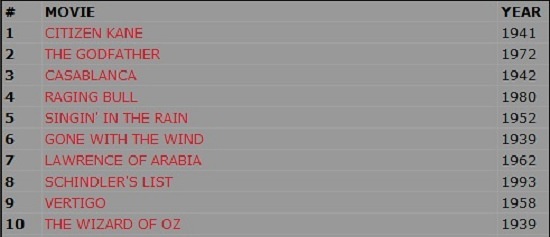 A film called Dark Shadows opened last week. It shares the same name and a number of characters with a cult soap opera from the late 60s, early 70s. Both feature time-tossed vampires who join their descendants 200 years in the future. However, the film plays the story as a wacky fish-out-of-water comedy while the soap opera, which was campy because, well, it was a soap opera with a production budget of $5, portrayed the story as a somber Gothic romance.
A film called Dark Shadows opened last week. It shares the same name and a number of characters with a cult soap opera from the late 60s, early 70s. Both feature time-tossed vampires who join their descendants 200 years in the future. However, the film plays the story as a wacky fish-out-of-water comedy while the soap opera, which was campy because, well, it was a soap opera with a production budget of $5, portrayed the story as a somber Gothic romance.
This week, Battleship opens. It shares its name with a Milton-Bradley board game that was first introduced in 1943. The game is advertised as a game of naval strategy where players try to sink each others armadas first by guessing location of ships on a grid. The film, which was based on the game, features the U.S. Navy combating a sea-based alien invasion force.
Now, this won’t be the kind of post that criticizes Hollywood for their lack of originality. Hollywood has always adapted works from other media for the screen. That is not necessarily a bad thing. To prove my point, let’s take a look at the Top 10 films on the 2007 version of AFI’s “100 Years…100 Movies” list.
Now, you can argue semantics about this list all night–this film should be higher, that one lower, this film included, that one not–but we can pretty much all agree that these are great films. What do we see here? We have five films based on novels or plays (The Godfather, Casablanca, Gone With the Wind, Vertigo, and The Wizard of Oz), four films based on or inspired by the lives of real people (Raging Bull, Lawrence of Arabia, Schindler’s List and Citizen Kane, which was a fictionalized account of William Randolph Hearst’s life) and one inspired by Hollywood’s history (Singin’ in the Rain). Not one wholly original, but great films nonetheless.
But those were adaptations done right. Unfortunately, Hollywood has the nasty habit of wanting to put their own stamp on properties they adapt, usually with not-so-good results. And Dark Shadows and Battleship take this habit to a dangerous and puzzling new level.
Now, I’m not naive as to think that every original work should be adapted to the screen with no changes. I realize that it would be impossible for eight seasons of a TV series, 300 pages of a novel, or 200 issues of a comic book to be squeezed into one two-hour movie. But doing a good adaptation means keeping the stuff that works, keeping the same tone and characterization, and if you are going to change anything, change it to the better. The problem lies in the fact that the film studios definition of better doesn’t really end up as being better.
 This problem, unfortunately, is nothing new. Studios have been making changes to classic works from other medium for decades. Whether it be modern literature, like The Bonfire of the Vanities (Does the journalist need to be British? Why can’t it be Bruce Willis? And does Sherman McCoy have to be such a erudite jerk? Why can’t he be nice, like Tom Hanks? And why have spot-on, social satire? Wouldn’t broad comedy be better?), classic literature like The Scarlet Letter (You know what would make kids pay more attention to the book in school? If Hester diddled herself in the tub.), comic books like Jonah Hex (What? The character is basically the cowboy antihero archetype that led Clint Eastwood and Charles Bronson to stardom? That will never work in films. Give him superpowers, have him stop an anacronistic weapon of mass destruction, and, please, make it campy), or video games, like Super Mario Brothers (You know who the best actors to play a pair of Italian plumbers would be? An British Cockney and a Latino American! And Dennis Hopper playing their turtle nemesis! It’s like printing money!), more than one film adaptation was ruined by studio’s “improvement.” But Dark Shadows and Battleship take these kind of changes to an entirely new, and dangerous level.
This problem, unfortunately, is nothing new. Studios have been making changes to classic works from other medium for decades. Whether it be modern literature, like The Bonfire of the Vanities (Does the journalist need to be British? Why can’t it be Bruce Willis? And does Sherman McCoy have to be such a erudite jerk? Why can’t he be nice, like Tom Hanks? And why have spot-on, social satire? Wouldn’t broad comedy be better?), classic literature like The Scarlet Letter (You know what would make kids pay more attention to the book in school? If Hester diddled herself in the tub.), comic books like Jonah Hex (What? The character is basically the cowboy antihero archetype that led Clint Eastwood and Charles Bronson to stardom? That will never work in films. Give him superpowers, have him stop an anacronistic weapon of mass destruction, and, please, make it campy), or video games, like Super Mario Brothers (You know who the best actors to play a pair of Italian plumbers would be? An British Cockney and a Latino American! And Dennis Hopper playing their turtle nemesis! It’s like printing money!), more than one film adaptation was ruined by studio’s “improvement.” But Dark Shadows and Battleship take these kind of changes to an entirely new, and dangerous level.
Dark Shadows is the latest example of a film trying to present a property that is loved by a large, cult audience while having the studio, or, in this case, the director put their own stamp on the project. But what it really is just an unnecessary form of this type of marketing.
 While I don’t deny that Dark Shadows does have a following, the fans of the show are not exactly in the 18-35 demographic that make films a hit. It was before my time and I’m way out of that demographic.
While I don’t deny that Dark Shadows does have a following, the fans of the show are not exactly in the 18-35 demographic that make films a hit. It was before my time and I’m way out of that demographic.
And, really? Do you need help marketing a movie where Tim Burton directs Johnny Depp again? You could have kept the fish out of water/man out of time plot, you could have even kept the main character a vampire, you could have kept the premise the same and not have it tie into Dark Shadows at all and people would most likely still have come to see it.
The real reason that the film is called Dark Shadows is because Tim Burton was a fan of the series and wanted to do his own take on it, a take even he knew that fans of the TV show wouldn’t like. I’m sure Burton probably sold the idea to studios using the TV shows built in fan base. But this was Burton co-opting an existing property for his own use when he could have, and should have, created something original that would have still allowed him to say what he wanted to say. Dark Shadows fans have a right to be upset.
 The case with Battleship is even more absurd. It’s not really a case of an adaptation being screwed up by Hollywood, because, really, if there was any way to adapt that particular board game, it would probably an even worse film than this one.
The case with Battleship is even more absurd. It’s not really a case of an adaptation being screwed up by Hollywood, because, really, if there was any way to adapt that particular board game, it would probably an even worse film than this one.
One of the producers of this film is Hasbro, the toy company that bought out Milton Bradley and owns the rights to G.I. Joe, Transformers and, you guessed it, Battleship (And Candy Land, which also has a film in the works). What happened was that Hasbro saw how much money they could make on films with the first two properties, so they decided to make a film out of every piece of intellectual property they own, whether making it into a film made sense or not. Personally, I cannot wait for Easy-Bake Oven: The Movie.
Battleship, like Dark Shadows, is a film that could have been released under another name and still do probably the same amount of business. Also, like Dark Shadows, the demographic of the source material will probably not follow it to the big screen even it was an exact representation of the game. What we have here is a generic alien invasion flick with the twist that the invasion takes place at sea.
 Yes, rumor has it that there will be a scene in the film that mimics the gameplay of the original game, and I’m fairly certain that at some point in the film we will see a character, most likely Liam Neeson’s, pull a pair of binoculars away from their faces, squint off into a point just past where the camera was placed, and utter with grim, steely reserve, “They sank my battleship” (or some variation there of). But other than that, the film could have been called Aliens At Sea and it would not have made a bit of difference, except that it would have been mocked slightly less in the press.
Yes, rumor has it that there will be a scene in the film that mimics the gameplay of the original game, and I’m fairly certain that at some point in the film we will see a character, most likely Liam Neeson’s, pull a pair of binoculars away from their faces, squint off into a point just past where the camera was placed, and utter with grim, steely reserve, “They sank my battleship” (or some variation there of). But other than that, the film could have been called Aliens At Sea and it would not have made a bit of difference, except that it would have been mocked slightly less in the press.
So this is what the state of the film adaptation is today. The source material is reduced to a name only, a name Hollywood can use to practice a new kind of originality. The names become tools for directors to work out the issues they had with the original source or companies to earn a quick buck from their intellectual property in by any means necessary. Hollywood has always been accused of not caring about the books, TV shows and comics they adapt. At least now, they are being honest about it. And they get to have the best of both worlds–a film with a recognizable public image that is an “original” creation by the Hollywood establishment.
Unfortunately, this trend will not stop here. By now we should all be familiar Michael Bay’s Ninja Turtles, which every one from Bay to co-creator Kevin Eastman have promised fans of the Teenage Mutant Ninja Turtles would deliver “everything that made [them] become fans in the first place.” Everything except the characters being Teenagers (they will be a bit older) or Mutants (they’re aliens). They couch these changes as “building a richer world,” as if the world that made the Turtles a pop culture phenomenon for thirty years wasn’t rich enough.
And you thought Demi Moore writhing in a bathtub was bad.





